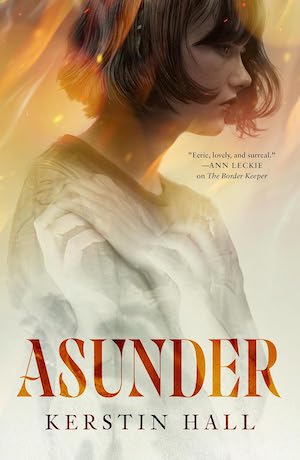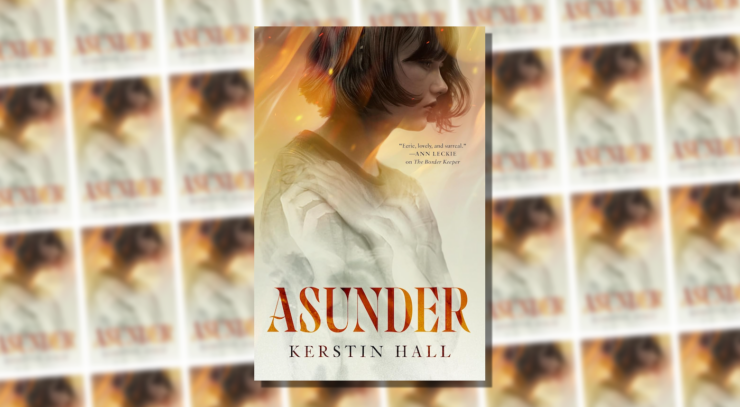Have I ever met a lonelier character in SFF than Karys Eska? Karys appears to have no one in her life—other than a tenuous professional relationship with the Second Mayor of Psikamit, who hires Karys in order to make use of her gifts. She’s a Deathspeaker, with the ability to peel aside the Veneer—to see past “the surface of reality” and speak with the recently deceased. Very useful, when someone wants to know how someone else died.
She has this ability, in essence, because she sold her soul to a devil—one of the Ephirite, the dominant, magical, god-like beings who grant power to humans for a considerable price. The keeper of Karys’s compact, Sabaster, has three horrible faces in his torso, as well as wings and a palace you really don’t want to visit. Eventually, Sabaster will call her compact, which is a nice way to say that he will remove Karys from the land of the living and do what he wants with her. And what he wants is particularly horrifying.
As with her debut novel, the immersive and compelling Star Eater, Kerstin Hall chucks you straight into Asunder and asks you to keep up. She is a master of consistent, sometimes subtle worldbuilding; anything she needs you to understand, Karys sees, or interacts with, or has cause to explain or have explained to her, succinctly and elegantly. (A favorite moment of mine involves one nation’s specific floral language.) If you don’t understand something at a certain point in the story, you will when you need to—and there is a lot here to understand, from the demise of the Bhatuma (the previous gods of this world, also called heralds) to the use of the unearthly Veneer, to the uneasy peace between the nations of Mercia and Varesli, and the existence of another, independent nation off in the sea.
At Asunder’s start, Karys is on a job, working for the aforementioned Second Mayor to find out what has become of a missing delivery. A series of seaside caverns holds more secrets than expected, including a deadly creature called a Construct that removes her guide from the world—in bloody and terrifying fashion—in mere seconds.
Buy the Book


Asunder
Trying to get out of this damp deathtrap, Karys encounters a stranger who desperately needs her help. They make a complex bargain that involves magic and a tricky relic; they escape, but not without a price. Ferain, the stranger, is supposed to be held in a sort of stasis by the relic and the magic Karys worked. Instead, he’s inside her shadow, and her head.
If you think that sounds like it might, under some circumstances, be the premise of a certain kind of romance, you aren’t entirely wrong; a slow-burn connection develops between Karys and Ferain as they try to figure out what exactly happened and how to solve this predicament without killing one or both of them. This quest will take them into strange company and across borders, into canyons and into the presence of a testy herald who survived the slaughter of the rest of her kind. It will bring up childhood trauma and terrible choices, and push this lonely, aching young woman to reluctantly let people in—and maybe to be just a little less hard on herself while she’s at it.
Karys is lonely, but Karys is also singular in the way she moves through the world; for all the chaos and body-sharing that drives her story, Hall writes her with a distinct, unmatched sense of holding herself apart. She’s prickly and resistant; she is driven by the looming, unspecified deadline of her compact with Sabaster, but the proximity of Ferain, who is gentle, privileged, and carrying his own griefs, is a wrinkle she did not expect and could not have prepared for. When they head to Varesli, his home country, in the company of an enthusiastic scholar named Winola, the story becomes a road trip that involves travel by giant spider and encounters with skin-thieves. I wouldn’t call it fun, exactly, but it’s entirely engrossing and there is something new to discover—and marvel at or be horrified by—at every turn.
Of course, there’s also Karys’s burgeoning connection with Ferain; her growing friendship with Winola, who hopes to user her skills to help separate the two of them; and the presence of Haeki, a friend from Karys’s childhood who is at least as stubborn as Karys. It is a lively group even before they encounter a delightful teenager who attaches herself to the party once they reach Varesli.
What always strikes me, in a Kerstin Hall book, is the sheer scale of her imagination: One city sits against a massive wall, and travel up it is quite unusual but has nothing on the Silkess, a means of transit somehow both biological and steampunky. (There is also a train that flies through the sky and has cars made of rocks, sort of.) At times I wanted a map, in part because I could only imagine how much more there might be to find on it. Some of the immensity of this world is not geographical: There are drugs made from the corpses of gods, divine concerns about procreation, and at least a couple of kinds of magic.
Here and in her other work, Hall is interested in power, in overlapping realms and competing mythologies, in who rules and how they attain and keep that position; she also remains fundamentally aware of the body horror inherent in unwanted pregnancy. It can, at moments, be a little hard to see the big, terrifying, eldritch-horror picture when there is so much immediate imagination on display at ground level, whether big-dog taxis or simply the enjoyment one might take in Karys’s attitude, and the slow unraveling of all the bits of her history that have brought her to this fraught moment at which everything—including someone else’s life as well as her own—is on the line.
With its unusual divinities, visceral physicality, and lushly invented setting, Asunder is a cousin to Emma Mieko Candon’s The Archive Undying, which is also a cousin to Alaya Dawn Johnson’s The Library of Broken Worlds; all three novels, different as they are, stand out for their flawed, appealing protagonists struggling in a massively complex world full of outsized powers. Everything is big in Asunder in part because Karys is small, just one person, and yet there is a distinct sense that something bigger than her hinges on her actions.
This story sits just under the skin, a tangle of questions about faith and shame and what a person does with the power they have—or that is given to them. It is, immersively and emotionally, about survival: how a person survives, what they do to survive, what they endure while surviving, and where the choices they make in order to survive wind up taking them. I can’t shake Karys and her choices out of my head, and frankly, I don’t want to. My sole complaint about Asunder is the abruptness of its ending, which suggests there is much more to this story. There are many things left unresolved, and so many new questions arise in the wake of the dizzying finale. Though it’s not indicated anywhere on the book, Hall is writing a sequel; she said in an interview, “I haven’t finished writing it, and it isn’t yet contracted, so it may be a while until it comes out—but that’s where my heart is at, and I’m very excited to continue the story.”
This world deserves more story, and more time, and more readers, and I hope it gets all three.
Asunder is available from Tordotcom Publishing.
Read Chapter One and Chapter Two.










